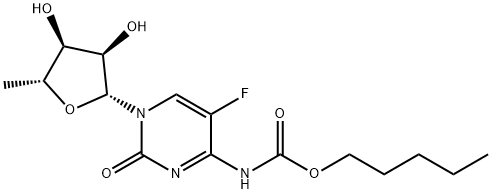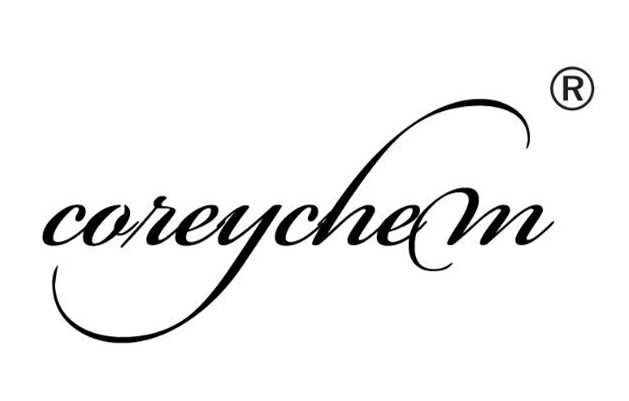

Capecitabine
| Price | USD100.00 |
| Packge | 25KG |
- Min. Order:1KG
- Supply Ability:100KG
- Time:2019-07-06
Product Details
- Product NameCapecitabine
- CAS No. 154361-50-9
- EINECS No.1806241-263-5
- MFC15H22FN3O6
- MW359.35
- Appearancepowderwhite to beige
- Melting point 110-121°C
- storage temp. 2-8°C
- density 1.49±0.1 g/cm3(Predicted)
CR081
| Capecitabine Basic information |
| Product Name: | Capecitabine |
| Synonyms: | Capcitabine;Pentyl (1-((2R,3R,4S,5R)-3,4-dihydroxy-5-methyltetrahydrofuran-2-yl)-5-fluoro-2-oxo-1,2-dihydr;5'-DEOXY-5-FLUOROCYTISINE;5'-DEOXY-5-FLUORO-N-[(PENTYLOXY)CARBONYL]CYTIDINE;CAPECITABINE;RO-9-1978;pentyl [1-(3,4-dihydroxy-5-methyl-oxolan-2-yl)-5-fluoro-2-oxo-pyrimidin-4-yl]aminoformate;XELODA |
| CAS: | 154361-50-9 |
| MF: | C15H22FN3O6 |
| MW: | 359.35 |
| EINECS: | 1806241-263-5 |
| Product Categories: | Inhibitors;Active Pharmaceutical Ingredients;Antineoplastic;Bases & Related Reagents;Intermediates & Fine Chemicals;Nucleotides;Pharmaceuticals;Antineoplastic drug, 5-FU analog;Anti-cancer;API;XELODA;Cardiovascular Drugs |
| Mol File: | 154361-50-9.mol |
 |
|
| Capecitabine Chemical Properties |
| Melting point | 110-121°C |
| Fp | 87℃ |
| storage temp. | -20°C Freezer |
| solubility | H2O: soluble10mg/mL, clear (warmed) |
| color | white to beige |
| Merck | 14,1754 |
| InChIKey | GAGWJHPBXLXJQN-UORFTKCHSA-N |
| CAS DataBase Reference | 154361-50-9(CAS DataBase Reference) |
| Safety Information |
| Hazard Codes | T |
| Risk Statements | 45-60-61-68 |
| Safety Statements | 53-22-36/37-45 |
| RTECS | HA3852500 |
| Hazardous Substances Data | 154361-50-9(Hazardous Substances Data) |
| MSDS Information |
| Provider | Language |
|---|---|
| Capecitabine | English |
| Capecitabine Usage And Synthesis |
| Indications and Uses | Capecitabine is a new form of oral fluorinated pyrimidine drug. Capecitabine was developed by Roche Pharmaceuticals, and its commercial name is Xeloda. Capecitabine can change in vivo into 5- FU, an anti-metabolizim fluorine pyrimidine deoxynucleoside carbamate drug that targets cancer cells to inhibit cell division and disrupt RNA and protein synthesis. Its effects are significantly tied to the level of TP enzyme expression in neoplastic tissue and to DPD enzyme in vivo expression. It is suitable as further treatment for advanced primary or metastatic breast cancer patients who have not responded to paclitaxel or anthracycline antibiotics. As an anticancer drug, it is mostly used to treat advanced primary or metastatic breast cancer, as well as in treatment for non-small cell lung cancer, pancreatic cancer, bladder cancer, rectal cancer, colon cancer, gastric cancer, and other solid tumors. Many drugs such as taxanes (paclitaxel, docetaxel, mitomycin, cisplatin, etc.) can increase TP enzyme expression in neoplastic tissues and also have curative effects on gastric cancer. When used in combination with Capecitabine, these drugs can also improve Capecitabine’s anticancer abilities and produce synergistic effects. |
| Clinical trials | Analyses of nearly 400 randomized comparisons of clinical outcomes show that a combination of adriamycin, cisplatin or oxaliplatin with 5-FU, compared to a combination of these drugs with Capecitabine, has a two-fold difference in curative efficacy and lowers toxicty. A large-scale Chinese clinical trial of Capecitabine in combination with DDP in the treatment of stage II gastric cancer also proves its advantages of high efficacy, low toxicity, and affordability. |
| Drug interactions | Currently, there are no side effects of clinical significance when used in combination with antihistamines, NSAIDs, morphine, paracetamol, aspirin, antiemetic drugs, and H2 receptor antagonist drugs. Capecitabine’s binding rate with serum protein is relatively low (64%), and its possibility of interacting through substitution with drugs that bind closely with proteins is currently unknown. In external experiments, Capecitabine has not shown any influence on human liver microsomal P450 enzyme. If any phenytoin and coumarin derivatives anticoagulants are used in combination with Capecitabine, dosages should be lowered. |
| Adverse effects | Common adverse reactions include nausea, vomiting, oral ulcers, abdominal pain, diarrhea, loss of appetite, and skin changes. There have also been reports of some patients experiencing transient myelosuppression, hair loss, tears, headache, and dizziness. |
| Warnings and precautions | Capecitabine is a bone marrow inhibitor; a blood exam must be administered before every usage to monitor blood cell and platelet count. This product poses toxic side effects to the liver, so liver functions must be routinely examined. Additionally, heart functions should also be monitored to prevent irreversible toxic reactions. If venous transfusion of the drug is required, the aforementioned organ functions should be tested for suitability before administration. Capecitabine may cause damage to embryos, thus making it unsuitable for pregnant women. Women using this drug are also not suitable for pregnancy. Even after treatment is ended, this drug may have some impact on fertility. |
| Chemical Properties | Colourless solid |
| Uses | An antineoplastic agent. A prodrug of doxifluridine. |
| Uses | Capecitabine is an antineoplastic agent. Capecitabine is a prodrug of Doxifluridine (D556750). |
| Uses | An antiproliferative 5-fluorouracil releasing compound |
| Definition | ChEBI: A carbamate ester that is cytidine in which the hydrogen at position 5 is replaced by fluorine and in which the amino group attached to position 4 is converted to its N-(penyloxy)carbonyl derivative. Capecitabine is a antineoplastic agen used in the treatment of cancers. |
Company Profile Introduction
Henan CoreyChem Co., Ltd, based on the original Zhengzhou Cote Chemical Research Institute, be brave in absorbing highly educated talents & overseas returnees; actively responded to Zhengzhou City High-tech Zone Government’s Special Care Policy, reorganized and founded in National University of Science and Technology Park, which is a high-tech, stock enterprise of high-end chemical Custom synthesis;The park was created by the People's Government of Henan Province, and proved by Ministry of Education and the National Science & Technology, taking the construction mode of "many college a park, and common development", mainly depends on Zhengzhou University and Henan University’s scientific research and talent advantage to set up Universities, scientific research institute and enterprise scientific research achievements transformation platform, to make high-tech enterprises incubate, is the new high-tech talent gathering base, high and new technology industry enterprise radiation base, colleges and universities technological innovation base.
Henan Coreychem Co., Ltd, facing global High-tech pharmaceutical raw materials, high complex new type intermediates, fine chemicals custom synthesis, scale-up production and Rare chemicals trade. Corey have well-equipped machine, strong technical force and considerate marketing team service. We also have rich experience advantage in basic research, small scale process development, scale-up, industrial technology development & production and cost control.
Recommended supplier
-
VIP1年
- SETV ASRV LLP
- 154361-50-9 CAPECITABINE 95-99%
- Inquiry
- 2024-09-11
-
VIP1年
- Granules India Limited
- 154361-50-9 Capecitabine 99%
- Inquiry
- 2024-03-22
-
VIP1年
- Kekule Life Sciences Limited
- 154361-50-9 99%
- Inquiry
- 2024-03-19
-
VIP1年
- Aspen Biopharma Labs Pvt Ltd
- Capecitabine 98%
- Inquiry
- 2024-03-16
-
VIP1年
- Myosynth Laboratories Pvt Ltd
- 154361-50-9 Capecitabine 98%
- Inquiry
- 2024-03-14
-
VIP1年
- SP Accure Labs Pvt Ltd (SPAL)
- Capecitabine 154361-50-9 98%
- Inquiry
- 2024-03-13
-
VIP1年
- Vijaya Pharma And Life Science
- 154361-50-9 Capecitabine 98%
- Inquiry
- 2024-03-13
-
VIP1年
- Khandelwal Laboratories Private Limited
- 154361-50-9 98%
- Inquiry
- 2024-03-06
-
VIP1年
- Shreyaa Medilife Private Limited
- 154361-50-9 Capecitabine 98%
- Inquiry
- 2024-03-04
-
VIP1年
- Mac Chem Products (India) Pvt Ltd (Naprod Group)
- Capecitabine 98%
- Inquiry
- 2024-02-28
- Since:2014-12-17
- Address: No.967,15th Floor,Unit 7, Building 1, No.70 of DianChang Road, High-tech Development Zone, Zhengzho
INQUIRY
